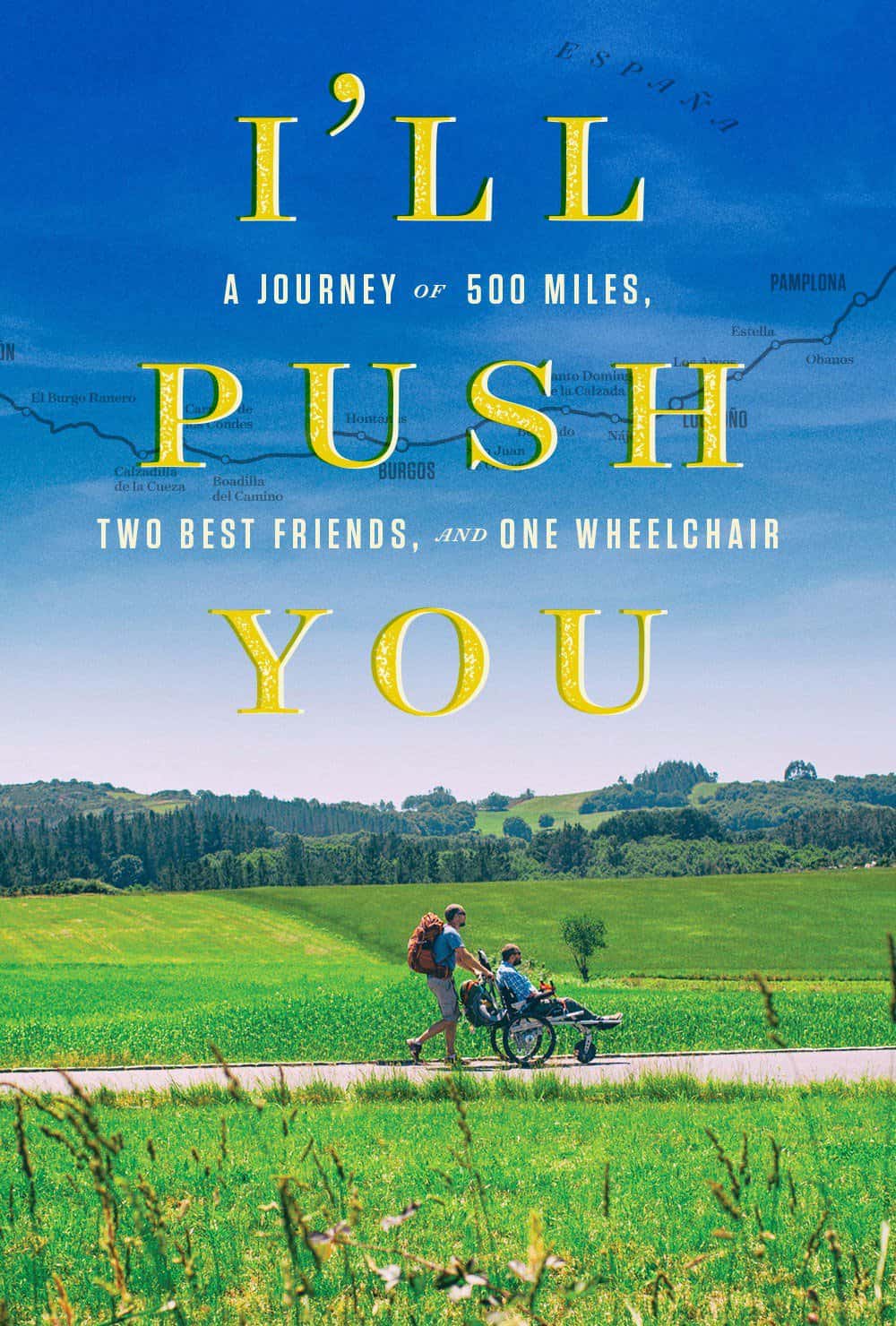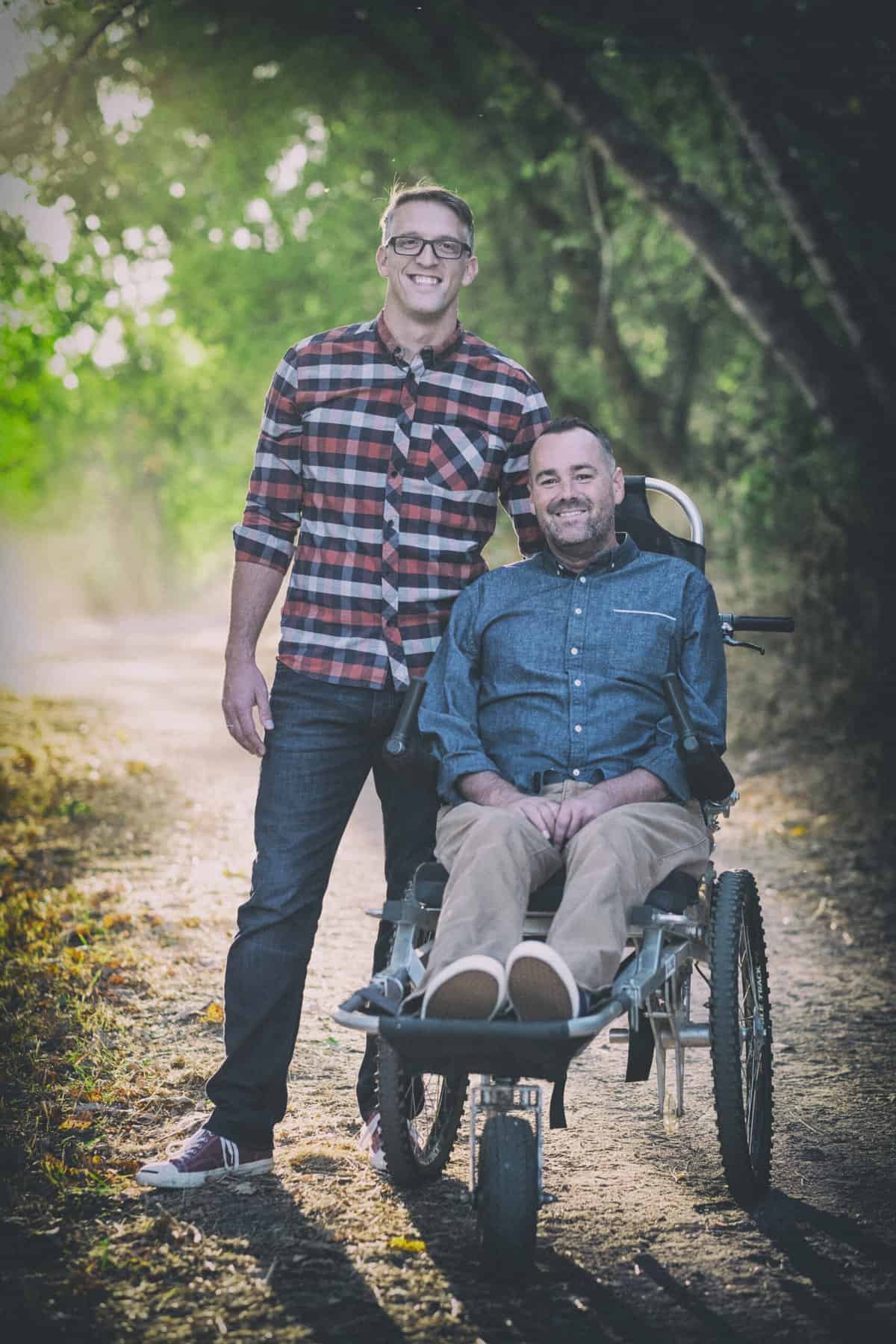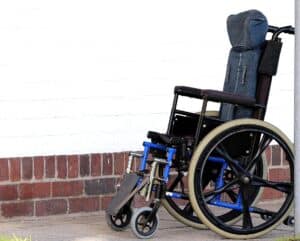 In 2014, lifelong friends Justin Skeesuck and Patrick Gray completed the Camino de Santiago, a 500-mile pilgrimage across northern Spain.
In 2014, lifelong friends Justin Skeesuck and Patrick Gray completed the Camino de Santiago, a 500-mile pilgrimage across northern Spain.
Justin has a degenerative neuromuscular condition known as Multifocal Acquired Motor Anoxopathy, and uses a wheelchair. So Patrick pushed him. The documentary I’ll Push You is the story of their extraordinary journey.
Talking with Justin, Patrick, and documentary co-directors Chris Karcher and Terry Parish about the trip, I had to start by asking, “How did you make this happen?”
Chris replied, “Patrick said ‘Yes, I’ll push you,’ and we said ‘Yes, we’ll film you!’”
Yet the story is so much more than two friends, a wheelchair, a film crew, and a 500-mile pilgrimage. “Camino” may mean “path,” but this particular path is a definite hike, and the phrase I’ll Push You is somewhat deceptive. The Camino simply doesn’t allow for a wheelchair to be “pushed” over a significant portion of the trail. Justin’s wheelchair was pushed, pulled, lifted, tugged, and sometimes even carried—both with and without Justin in it—over terrain even experienced hikers can find challenging.
On the very first day of their journey, Justin and Patrick’s goal included seventeen miles of hiking, with an altitude gain of 4,000 feet. And of course, that was just the beginning. The first week of the trip also brought rain, which in turn brought mud—thick, impenetrable mud. The camera zooms in at one point to show Justin’s mud-clotted wheels revolving so slowly through the muck that it’s almost painful to watch.
And then one of Justin’s wheels breaks clean off.
The good spirits that both Justin and Patrick maintain throughout the trip are so palpable, I asked Terry if he turned the camera off whenever someone was in a bad mood. But Terry said no: “It was almost disappointing as the filmmaker, because you just want to grab a little bit of that drama! But the trust and love and history Justin and Patrick share…it’s a testament to where the story had to go.”
The film brings viewers right into the middle of Justin and Patrick’s friendship, and the depth of their relationship is apparent. As is their humor: when the camera focuses on Patrick, exhausted and slumped over for a much-needed rest, Patrick then looks at Justin and says, “Okay, seriously dude—it’s time to walk.”
 One particularly poignant element of the film is watching Justin and Patrick navigate their lodging along the way. Most of the accommodations for Camino pilgrims weren’t designed with wheelchairs in mind, and so on multiple occasions, having walked for miles either pushing or pulling Justin’s chair, Patrick has to then figure out how to navigate elevators too small to hold a wheelchair, and bathrooms designed for a maximum occupancy of one. Watching Patrick bathe Justin, feed Justin, and brush Justin’s teeth shows both a tenderness and a pragmatic aspect to Patrick’s character—he doesn’t make a big deal about it, this is just what needs to be done.
One particularly poignant element of the film is watching Justin and Patrick navigate their lodging along the way. Most of the accommodations for Camino pilgrims weren’t designed with wheelchairs in mind, and so on multiple occasions, having walked for miles either pushing or pulling Justin’s chair, Patrick has to then figure out how to navigate elevators too small to hold a wheelchair, and bathrooms designed for a maximum occupancy of one. Watching Patrick bathe Justin, feed Justin, and brush Justin’s teeth shows both a tenderness and a pragmatic aspect to Patrick’s character—he doesn’t make a big deal about it, this is just what needs to be done.
And in order to complete the pilgrimage, Justin has to be willing to receive this help.
“As humans we want independence,” Justin says. “To do what we want to do, when we want to do it, and not be told, or handheld through it, or anything like that. I’ve learned that once I’ve let that go, love can flourish. And there’s this weird beauty there.”
It’s difficult to be constantly dependent. But instead of focusing solely on himself, Justin looks at the people who serve him: “I have to let them find their joy in it, because they love it.”
Many people found that joy in service over the course of the Camino. One of the most surprising elements of the film was the sheer number of pilgrims who came alongside Justin and Patrick, to help them on their way. Some were planned ahead of time, but the overwhelming majority were just other people, hiking the Camino, who saw a need and stepped in to help. Some ended up staying with Justin and Patrick for days, if not weeks.
The communal aspect to the Camino pilgrimage is a thing of beauty. Terry notes that part of the reason this community can flourish is because, walking the Camino, travelers are reduced to their basic needs: the need to eat, the need to sleep, the need to walk. That’s pretty much it. “With everything stripped away,” Terry says, “people get the opportunity to rediscover the person that they were born to be.”
Now three years away from the journey, when asked what he took away from the Camino, Justin says, “My faith in humanity was restored.”
In a time where we are surrounded by a constant influx of bad news, the result of that incessant negative exposure is that we get jaded. “There are really bad things happening in this world,” Justin says. “But there are good people in this world. Really, really good people. The hearts of people are good.”
Patrick feels his biggest takeaway from the pilgrimage was one of personal transformation. “A reboot on my life,” he says. “How I approach my family, how I approach my faith, how I approach God…who Jesus was, who Jesus is, this idea of love lived out.”
“If I’m going to embrace a life that I believe Jesus calls me to live, all my motivation, for anything, should be love.”
“If I’m going to embrace a life that I believe Jesus calls me to live,” Patrick says, “all my motivation, for anything, should be love. True love is about the other person, it’s about sacrifice, it’s about embracing humanity and trying to find ways to ease the pain of the world. If I embrace love, I can be at a point where heaven and earth intersect for a moment.”
Patrick concludes, “That’s the avenue we should all be looking at: in our relationships with our kids, our spouses, our friends, strangers on the street. There is a moment every day where we can give people a glimpse of the love that God has for them by letting him move through us, by just loving, completely, all the time.”
Loving, completely, all the time…through a 500-mile pilgrimage and beyond. May we all have the opportunity to show that radical love of God in our own lives.
Editor’s Note: I’ll Push You debuts in theaters tomorrow, November 2nd, for a one-day-only special screening. For more information, click here.
Elrena Evans is Editor and Content Strategist for Christians for Social Action. She holds an MFA in creative writing from Penn State, and has also worked for Christianity Today and American Bible Society. She is the author of a short story collection, This Crowded Night, and co-author of the essay collection Mama, PhD: Women Write About Motherhood and Academic Life. She enjoys spending time with her family, dancing, and making spreadsheets.


